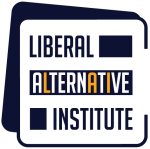ECONLIT2023 "ECONOMIC LITERACY: THE LIFE SKILL OF THE 21ST CENTURY
Date & Time: 18 February 2023, 09:00-16:00
Venue: HOTEL MERCURE, TETOVO
WHAT IS #ECONLIT2023?
The conference #Econlit2023 “Economic Literacy: The Life Skill of the 21st Century,” will set the stage for a discussion on the current state of affairs of economic literacy in North Macedonia, bring together experts and practitioners to explore the current state of economic literacy in North Macedonia, and discuss ways to improve it. The conference will provide a platform for examining the role of educational institutions in promoting economic literacy, and for exploring the contributions of the business and start-up sector to this goal. It will also provide an opportunity to learn about existing economic literacy programs in the country and to share best practices and innovative approaches.
By fostering a dialogue on these topics, the conference aims to set the stage for continued efforts to improve economic literacy in North Macedonia. The conference will feature four sessions, each of which will address a specific topic related to economic literacy and education.
WHAT WILL THE SESSION ENTAIL?
Session 1
The “Diagnosis of Economic Literacy in North Macedonia: Where are we?” session assesses and evaluates the role that government and other institutions can play in supporting and advancing economic literacy efforts, including discussions on the development of public policies and programs that promote economic literacy, as well as partnerships and collaborations with other organizations and stakeholders to support economic literacy initiatives. This session shall include input from representatives of state institutions and other stakeholders, who will provide insights and perspectives on the importance of economic literacy in their respective institutions and in the broader society.
Topics covered in this session include:
- The prevalence and distribution of economic literacy among different demographics in North Macedonia.
- The availability and accessibility of economic literacy resources and education in the country.
- The impact of economic literacy on individual and societal well-being.
- The perceptions and priorities of state institutions regarding economic literacy, including the importance of economic literacy for achieving organizational and societal goals.
- The role of state institutions in promoting and supporting economic literacy, including any programs or initiatives that are currently in place or being developed.
- Challenges and opportunities for improving economic literacy in North Macedonia, including potential partnerships and collaborations with other organizations or stakeholders.
Overall, this session aims to provide a comprehensive analysis of the current state of economic literacy in North Macedonia and to explore the role and perceptions of institutions in promoting and advancing economic literacy in the country.
Session 2
The “Stimulating the Development of Economic and Financial Education in High School and Higher Education” session will focus on the role that educational institutions can play in fostering economic literacy among students, including discussions on curriculum development, teacher training, and other strategies for incorporating economic literacy into the educational experience. This session includes a panel of academic representatives who will provide insights and perspectives on the ways in which economic literacy can be effectively integrated into education at these levels.
Topics covered in this session include:
- An analysis of the current state of economic literacy education in high schools and universities in North Macedonia, including any existing programs or initiatives.
- Strategies for embedding economic literacy into curricula, including the development of dedicated courses or the incorporation of economic literacy concepts into existing subjects.
- The types of programs or initiatives that might be developed to promote economic literacy in high schools and universities, and how these programs could be structured and delivered.
- The impact of economic literacy education on students and the future generations, including the potential benefits and long-term effects of such education.
- Challenges and opportunities for improving economic literacy education in high schools and universities in North Macedonia, including potential partnerships and collaborations with other organizations or stakeholders
Overall, this session aims to provide a comprehensive analysis of the ways in which economic literacy can be effectively integrated into the education system in North Macedonia, and to explore the potential impact and benefits of such education for students and the future generations.
Session 3
The “Harnessing economic and financial education to spur entrepreneurship and innovation” session will focus on the role that economic literacy can play in promoting entrepreneurship and innovation in the Republic of North Macedonia and the region. Representatives from start-up and incubation hubs will share insights and perspectives on the ways in which economic literacy can support and enable entrepreneurial and innovative activity in the country, and how businesses can provide educational resources and opportunities for employees, as well as how they can contribute to the development of economic literacy in the broader community.
Topics covered in this session include:
- The relationship between and potentional of economic literacy and entrepreneurship, including the ways in which economic literacy can enable and support entrepreneurial activity.
- Examples of start-ups and incubation hubs that have successfully leveraged economic literacy to drive innovation and growth.
- Strategies for promoting economic literacy among entrepreneurs and start-up communities, including the development of educational programs or resources.
- Challenges and opportunities for using economic literacy to spur entrepreneurship and innovation, and potential partnerships and collaborations with other organizations or stakeholders.
Overall, this session aims to explore the ways in which economic literacy can support and enable entrepreneurial and innovative activity in North Macedonia and the region, and to identify strategies and approaches for promoting economic literacy among start-up and entrepreneurial communities in the country. This session will provide a comprehensive analysis of the ways in which economic literacy can support and enable entrepreneurial and innovative activity, and identify strategies.
AGENDA
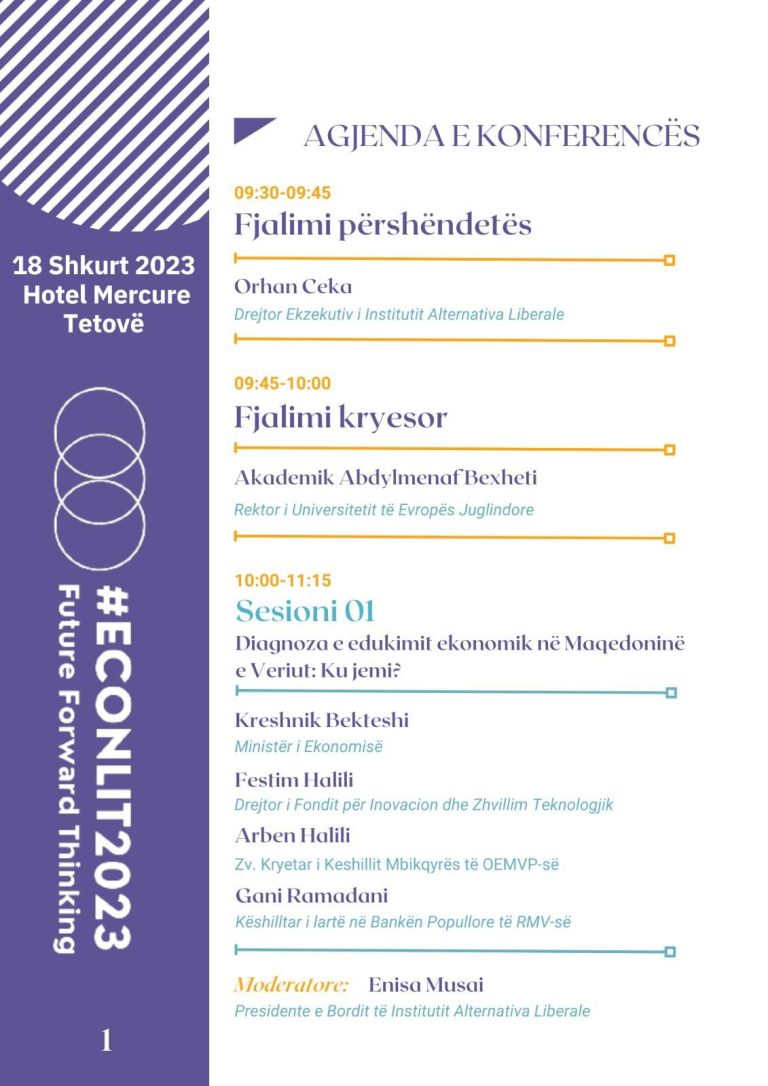
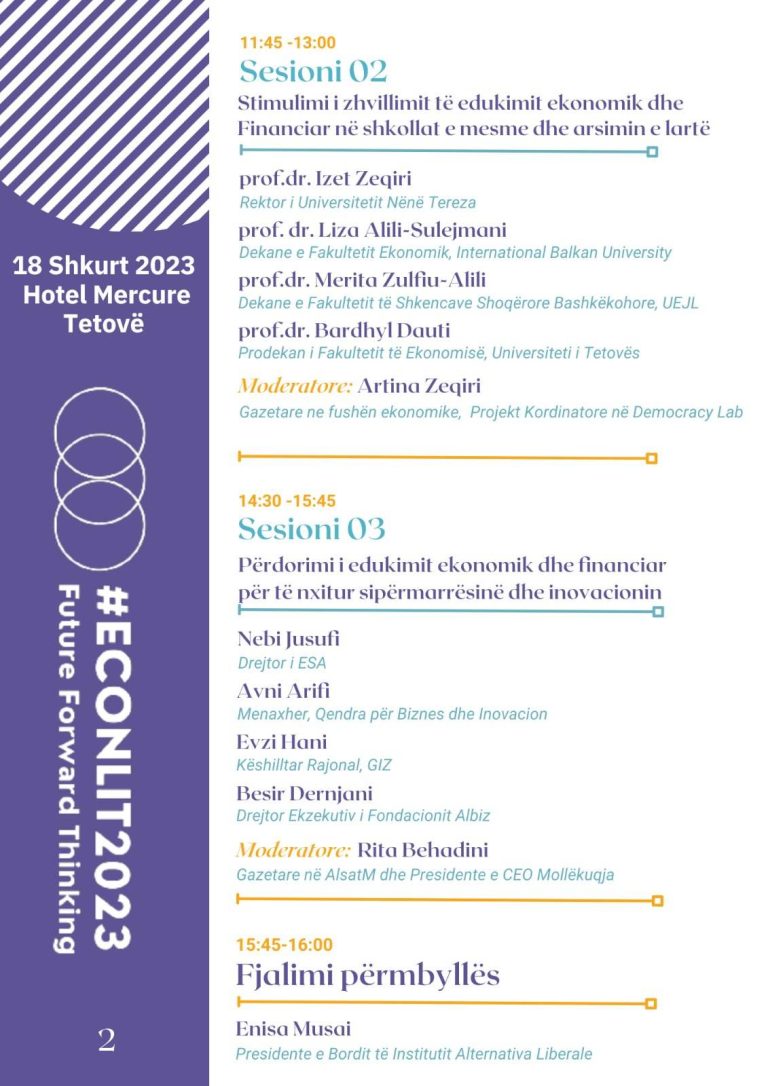
SPEAKERS
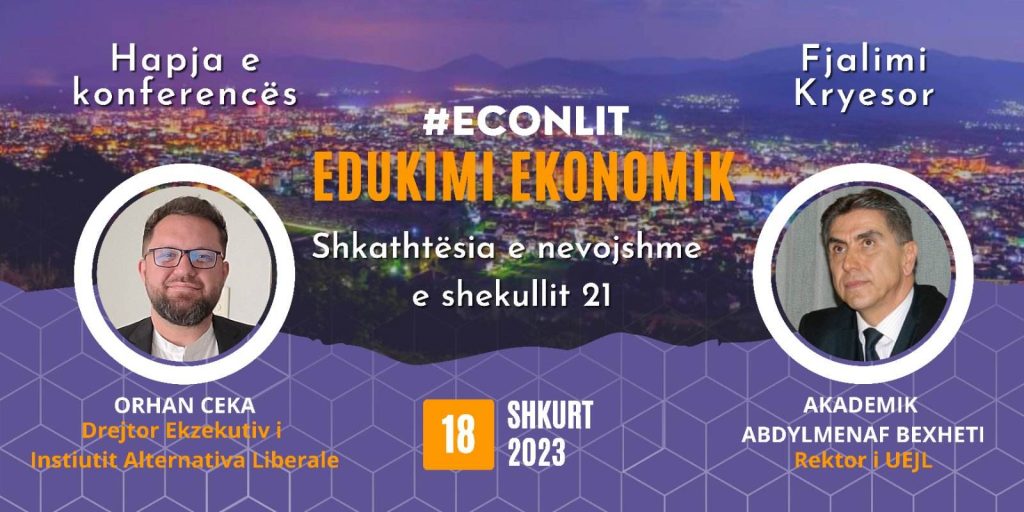
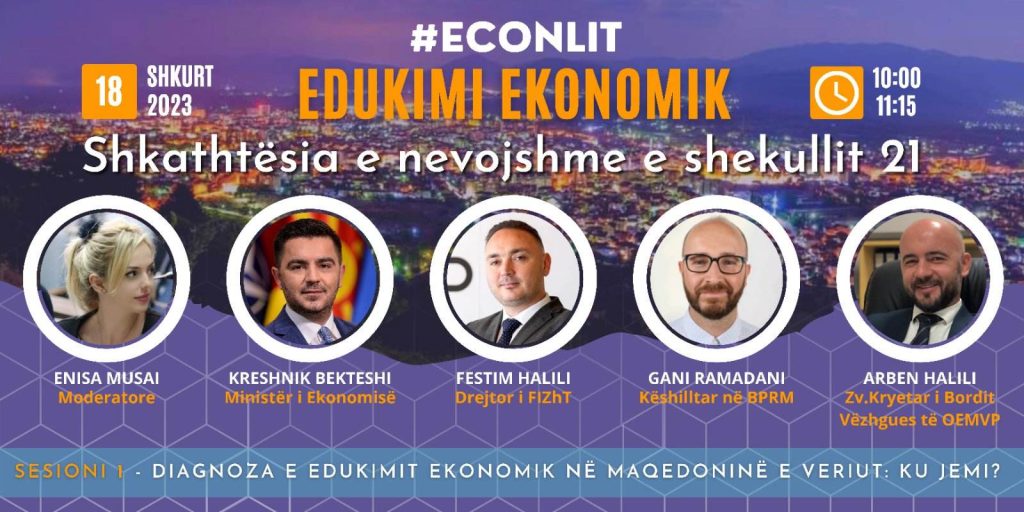

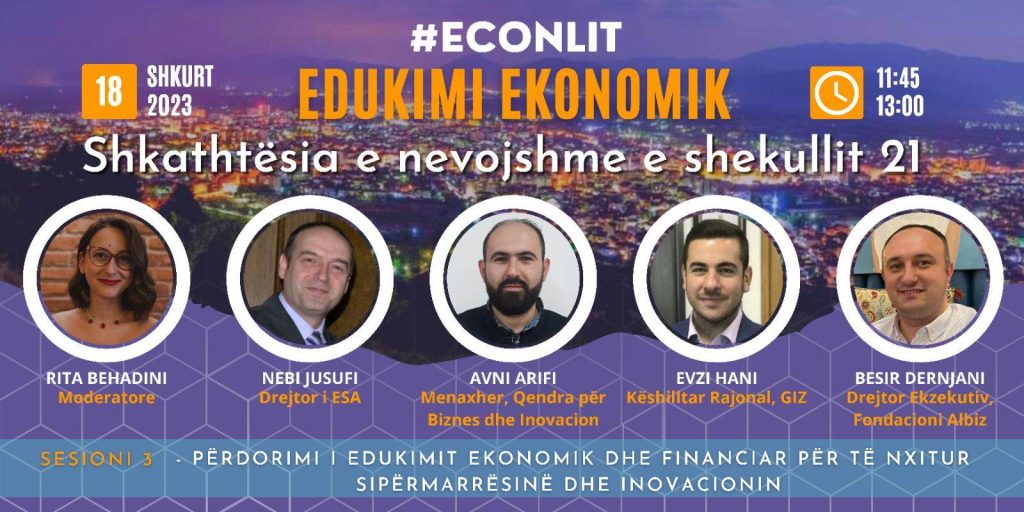
OUR PARTNERS
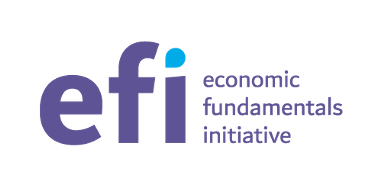
PARTICIPATION IN THE CONFERENCE
The #EconLit2023 Conference is a unique opportunity for scholars, practitioners, representatives of institutions, and business sector to share their knowledge and discuss the most pressing issues in the field of economics literacy. The conference with feature important keynote addresses and interactive panel discussions where participants can ask questions and share their thoughts in the Q&A part of each session. The PROGRAMME offers a glimpse of the wide-ranging topics that will be covered.
Participation in the conference is limited to a special invite-only cohort of scholars, practitioners, public officials and business representatives and media, who are passionate about economics literacy and want to stay ahead of the latest trends and developments.
Interested parties should write an email inquiring about participation, latest 01st February 2023, at econlit@lai.mk, with the subject: PARTICIPATION REQUEST FOR #ECONLIT2023.
The official language of the conference is Albanian. No translation will be provided in other languages.
#ECONLIT 2023 is part of ECONOMIC LITERACY PROGRAMME, implemented by Liberal Alternative Institute and supported by Economic Fundamentals Initiative (EFI). A major part of the programme is promotion of COMMON SENSE ECONOMICS, the online version of which can be accessed at: https://www.econfun.org/en/get-the-book (English) or https://www.econfun.org/sq/get-the-book (Albanian).
Adress:
Email:

Phone:
Working Hours:
Monday - Friday: 8am - 4pm
